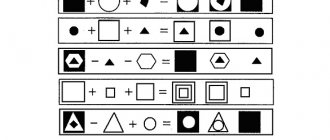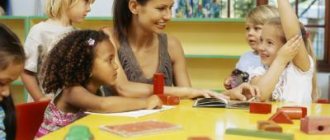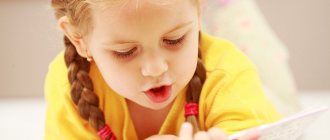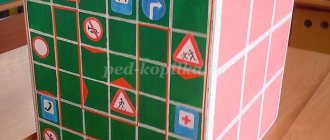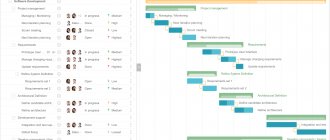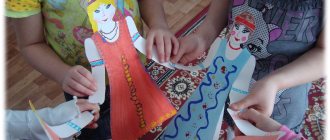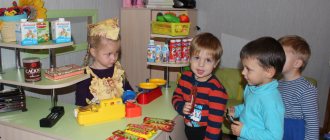Formation of prerequisites for UUD in preschool education educational and methodological manual on the topic
Formation of prerequisites for UUD in preschool educational institutions
Entering school is the beginning of a child’s long journey, the transition to the next age stage of life. The beginning of schooling radically changes the lifestyle of the child, and sometimes the whole family. The carelessness of preschoolers, their carelessness, and passion for play are becoming a thing of the past. Life begins, filled with new demands, responsibilities and restrictions. Studying at school requires the child to be ready for a new type of activity - educational. The ability to learn is the desire and ability to independently carry out educational activities. Educational activities should captivate younger schoolchildren, bring joy, and give satisfaction. Therefore, it is important to cultivate cognitive interests in preschoolers, since they are the ones who activate children’s abilities. The development of cognitive activity in preschoolers is one of the main aspects of children’s readiness for school. In the process of cognitive activity, the mental, emotional and volitional qualities of a person, his abilities and character are formed. Mental processes develop: voluntary attention and perception, thinking, memory, imagination, speech. Life experience is acquired, the surrounding reality is learned, knowledge is acquired, skills and abilities are developed, thanks to which the child’s personality itself develops.
A generalization of research by teachers and psychologists allows us to identify the main conditions under which interest in learning arises and develops:
- Educational activities should be organized so that the child actively acts, is involved in the process of independent search and “discovery” of new knowledge, and solves problematic issues.
- Educational activities should be varied. Monotonous material and monotonous methods of presenting it very quickly cause boredom in children.
- It is necessary to understand the importance of the material being presented.
- New material should be well connected to what children have learned before.
- Neither too easy nor too difficult material is of interest. The tasks offered to children should be difficult, but feasible.
- It is important to positively evaluate all the children’s successes. Positive evaluation stimulates cognitive activity.
- Demonstration and handout material should be bright and emotionally charged.
Nurturing cognitive interests is the most important component of nurturing a child’s personality and his spiritual world. And the success of organizing children’s educational activities largely depends on how correctly this issue is resolved.
What are universal learning activities?
The term “universal learning activities” means the ability to learn, i.e. the subject’s ability for self-development and self-improvement through the conscious and active appropriation of new social experience.
Universal learning activities are the child’s ability to self-development through active assimilation and acquisition of knowledge through practical activities, through the “ability to learn.”
At preschool age, there are 4 blocks of UUD:
1) personal; 2) regulatory;
3) educational; 4) communicative.
Personal UUD
Self-determination is the internal position of the future student, personal, professional, life definition. (What I am, what I want to become, what I will be, what I can, what I know, what I strive for, etc.);
Meaning formation – meaning and motivation of educational activities
(what meaning does the teaching have for me);
Moral and ethical assessment is the ability to correlate one’s actions with generally accepted ethical and moral standards, the ability to evaluate one’s behavior and actions, understanding basic moral norms and rules.
The prerequisites for personal UUD are:
- the ability to realize one’s capabilities, skills, qualities, experiences;
- the ability to correlate actions and events with accepted ethical principles and moral standards;
- ability to navigate social roles and interpersonal relationships;
- formation of cognitive and social motivation;
- formation of adequate self-esteem;
- developing the ability to come to the aid of a friend, the hero of a fairy tale, etc.;
- developing the ability to take into account someone else’s point of view;
- cultivate moral guidelines (love for loved ones, small homeland, respect for elders, caring attitude towards all living things, etc.)
Regulatory UUD
Goal setting – the ability to maintain a given goal;
Planning - the ability to plan your action in accordance with a specific task;
Forecasting – the ability to see the result of one’s activities;
Control – the ability to control one’s activities
by result of activity and by process;
Correction – the ability to see the indicated error and correct it as directed by an adult;
Assessment – the ability to evaluate the correctness of a chosen action or deed, to adequately understand the assessment
adult and peer;
The prerequisites for regulatory UUD are:
- the ability to carry out actions according to a model and a given rule;
- the ability to maintain a given goal;
- the ability to see the indicated error and correct it as directed by an adult;
- the ability to plan your action in accordance with a specific task;
- the ability to control your activities based on results;
- the ability to adequately understand the assessment of an adult and a peer;
- ability to work according to instructions from an adult;
- the ability to maintain a task throughout the entire duration of the task;
- willingness to choose an occupation for oneself from those offered to choose from;
- the ability to maintain attention while listening to a short text read by an adult or looking at a reproduction;
- the ability to correctly hold writing implements and instruments (pencil, pen, frame, magnifying glass, etc.) – development of fine motor skills of the hands.
Cognitive UUD
- Orientation in space and time;
- Ability to apply rules and follow instructions;
- Ability to evaluate the results of activities with the help of an adult;
- Ability to work according to a given algorithm;
- The ability to recognize and name objects and phenomena of the surrounding reality.
Information
- Ability to work from a book;
- Ability to navigate using symbols in a book;
- Ability to work from illustrations.
- Ability to use school supplies (pen, pencil, eraser).
brain teaser
- Classification
- Analysis
- Synthesis
- Comparison
- Generalization
- Seriation
- Sernancia
- Eliminating unnecessary things
- Selecting the right one
- Establishing cause-and-effect relationships, etc.
- Use of sign-symbolic means
- Modeling
The prerequisites for cognitive UUD are:
- skills in developing sensory standards;
- orientation in space and time;
- ability to apply rules and use instructions;
- the ability (with the help of an adult) to create action algorithms for solving assigned problems;
- the ability to recognize, name and identify objects and phenomena of the surrounding reality.
- the ability to carry out classification and serialization on specific subject material;
- the ability to identify essential features of objects;
- the ability to establish analogies on subject material;
- the ability to model (to identify and generally record the essential features of objects in order to solve specific problems.);
- the ability to perform sign-symbolic actions, coding, decoding objects;
- ability to analyze and synthesize objects;
- the ability to establish cause-and-effect relationships.
- orientation in space and time;
- ability to apply rules and use instructions;
- ability to navigate in a book;
- the ability to leaf through a book back and forth for a specific purpose;
- the ability to find the right page;
- ability to navigate using symbols in a book;
- the ability to work from an illustration (considering an illustration with different tasks: assessing the meaning of the entire illustration or part of it, searching for the necessary parts of the illustration, the necessary characters, objects, etc.);
- ability to use simple tools.
Communicative UUD
- Ability to establish contacts with peers and adults;
- Ability to interact and collaborate with peers and adults;
- Ability to organize joint activities in pairs, subgroups and teams;
- Ability to organize joint activities in pairs, subgroups and teams;
- Ability to conduct a monologue and answer questions;
- Mastery of non-verbal means of communication;
The prerequisites for communicative UUD are:
- the child’s need to communicate with adults and peers;
- mastery of certain verbal and non-verbal means of communication;
- build a monologue statement and dialogue speech;
- an emotionally positive attitude towards the collaboration process is desirable;
- communication partner orientation;
- the ability to listen to your interlocutor.
- ability to ask questions; ask for help;
- offer assistance and cooperation;
- agree on the distribution of functions and roles in joint activities.
- formulate your own opinion and position;
- construct statements that are understandable to your partner;
Types of tasks for the formation of universal educational actions
To form the prerequisites for personal UUD, the following tasks are used:
- participation in discussions, reasoning, disputes - during discussions, reasoning and disputes, children learn to argue and defend their point of view;
- summing up interim results and results of the lesson - during summing up, children comprehend the acquired knowledge and experience;
- creative tasks - increase interest in the process of cognition and learning new material;
- self-assessment - children are asked to evaluate their work, their achievements in class, and may also be asked to evaluate the work of other children;
- achievement diaries - kept in order to increase their effectiveness and self-esteem. You can invite children to put stickers in their diary for some achievement, even the smallest one;
To form the prerequisites for cognitive logical UUD, it is advisable to use the following tasks:
- classification - children are asked to distribute some objects into groups;
- analysis – it is proposed to isolate and divide an object into its constituent elements;
- synthesis - combining individual components into a whole;
- comparison - children are asked to find and highlight similarities and differences in objects;
- generalization - highlighting common essential properties in compared objects;
- seriation – establishing sequential relationships, arranging objects in a certain order;
- sernation - the construction of ordered increasing or decreasing series.
- eliminating the superfluous - finding a “superfluous” item and explaining why this item is superfluous.
- selection of the appropriate one - it is necessary to select an object that is suitable in meaning to the proposed items;
- passing through labyrinths - children are asked to walk through the labyrinth from beginning to end;
- work with different types of tables - children are offered games and exercises such as “What is missing in the table?”, “Fill in the table”, “What has changed in the table”, etc.;
- signs and symbols – ability to work with signs and symbols;
- working with diagrams, drawing up support diagrams;
- solving logical problems – solving various logical problems, including problems with negation;
- establishing cause-and-effect relationships - “what comes first, what comes next”;
To form the prerequisites for regulatory control, the following types of tasks are possible:
- “intentional errors” - children are offered tasks with premeditated errors, which they must find, name and justify;
- search for the necessary material (pictures) - you need to find among the proposed pictures pictures on a given topic;
- mutual control - children are asked to check the correctness of completing a particular task;
- mutual dictation (task) - work is carried out in pairs, children are asked to come up with a task from the proposed material on the topic for their partner and check the correctness of this task;
- learning material by heart - it is proposed to learn a poem, nursery rhyme, tongue twister, etc. by heart;
- “looking for errors” - tasks may be offered where you need to find errors, for example in words, or find incorrectly written letters;
- control survey - can be used both at the end of the lesson and during the lesson, in order to monitor the understanding of the topic. You can invite children to come up with their own questions on the topic for other children.
To form the prerequisites for communicative UUD, the following types of tasks can be offered:
- “make up a story”, “take a look at the object” - children are asked to make up a story or describe an object with or without reference to a picture;
- drawing up a dialogue (work in pairs) - you can invite children to act out the situation in pairs, using dialogue speech.
- “make up a task” - children make up a task for each other;
- “Express your opinion about...” – children are invited to express their opinions, for example, about the behavior of the children in the picture (good, bad), about objects (beautiful, not beautiful);
- discussion, reasoning, dispute - it is proposed to discuss certain issues on the topic, express your opinion, and prove your point of view;
- group work – any joint group work forms communicative learning tools;
- “explain...” - you can explain your actions, or comment on the picture.
- “answer questions” - children are asked to answer questions from the teacher or group on the topic being studied or on a specific task.
So, the main means of forming universal educational actions are educational tasks that vary in wording, such as: explain, check, prove, evaluate, invent, choose, compare, select, find a pattern, is the statement true, guess, observe, draw a conclusion, etc. etc., which direct children to perform various types of activities, thereby developing the ability to act in accordance with the set goal. Educational tasks encourage children to analyze objects in order to identify their essential and non-essential features; identify their similarities and differences; carry out comparison and classification according to specified or independently identified characteristics; establish cause-and-effect relationships; build reasoning in the form of connecting simple judgments about an object, its structure, properties; generalize, i.e. carry out generalization for a number of individual objects based on the identification of essential connections.
Methods for forming UUD
- Rely on the leading activity of preschoolers - play, use games with rules, game situations;
- Involve preschoolers in active activities: designing, drawing, modeling, experimenting, research, etc.;
- Make maximum use of the encouragement method: encourage children for activity, cognitive initiative, interest, stimulate children’s curiosity, any efforts aimed at solving a problem, any answer, even the wrong one;
- Make maximum use of the encouragement method: encourage children for activity, cognitive initiative, interest, stimulate children’s curiosity, any efforts aimed at solving a problem, any answer, even the wrong one;
- Make maximum use of the encouragement method: encourage children for activity, cognitive initiative, interest, stimulate children’s curiosity, any efforts aimed at solving a problem, any answer, even the wrong one;
- Train mental operations - classification, analysis, synthesis, comparison, generalization, analogy, seriation, sernation, etc.;
- Develop children's communication skills,
- verbal and non-verbal speech, creative abilities
- and self-control skills;
- Focus on the activities of the preschooler and
- its effectiveness, not its achievements;
And,
- A preschooler needs personal contact;
- Atmosphere of success;
- Help in gaining confidence in your strengths and abilities;
- Help in acquiring knowledge easily and with interest;
- A friendly and respectful attitude towards his personality.
- Encouragement and praise.
- Accepting him as he is;
- Adequate assessment of his activities and a ban on direct assessments of the child’s personality (lazy, stupid, sloppy, etc.).
Portrait of a preschool educational institution graduate
- Physically developed, mastered basic cultural and hygienic skills (personal results).
The child has developed basic physical qualities and the need for physical activity. Independently performs age-appropriate hygienic procedures and follows basic rules of a healthy lifestyle.
- Curious, active (personal results).
He is interested in the new, unknown in the world around him (the world of objects and things, the world of relationships and his inner world). Asks questions to an adult, likes to experiment. Able to act independently (in everyday life, in various types of children's activities). In cases of difficulty, seek help from an adult. Takes a lively, interested part in the educational process.
- Emotionally responsive (personal outcomes).
Responds to the emotions of loved ones and friends. Empathizes with the characters of fairy tales, stories, stories. Reacts emotionally to works of fine art, music and art, and the natural world.
- Mastered the means of communication and ways of interacting with adults and peers (communicative results).
The child adequately uses verbal and nonverbal means of communication, has dialogical speech and constructive ways of interacting with children and adults (negotiates, exchanges objects, distributes actions in cooperation). Able to change the style of communication with an adult or peer, depending on the situation.
- Able to manage one’s behavior and plan one’s actions based on primary value concepts, observing basic generally accepted norms and rules of behavior (regulatory results).
A child’s behavior is primarily determined not by immediate desires and needs, but by demands from adults and primary value ideas about “what is good and what is bad.”
The child is able to plan his actions aimed at achieving a specific goal. Complies with the rules of conduct on the street (road rules), in public places (transport, shops, clinics, theaters, etc.).
- Capable of solving intellectual and personal tasks (problems) that are age appropriate (cognitive results).
The child can apply independently acquired knowledge and methods of activity to solve new tasks (problems) posed by both adults and himself; Depending on the situation, it can transform ways of solving problems (problems). The child is able to propose his own idea and translate it into a drawing, construction, story, etc.
- Having primary ideas about oneself, family, society (closest society), state (country), world and nature (personal results).
The child has an idea:
- about yourself, your own belonging and the belonging of other people to a certain gender;
— about the composition of the family, family relationships and relationships, distribution of family responsibilities, family traditions; — about society (the closest society), its cultural values and one’s place in it;
- about the state (including its symbols, the “small” and “big” Motherland, its nature) and belonging to it;
— about the world (planet Earth, the diversity of countries and states, population, nature of the planet).
- Having mastered the universal prerequisites of educational activities (regulatory results):
the ability to work according to the rule and model, listen to an adult and follow his instructions.
- Having mastered the necessary skills and abilities (subject-specific results).
The child has developed the skills and abilities (speech, visual, musical, constructive, etc.) necessary to carry out various types of children's activities.
Formation of prerequisites for universal educational activities in preschool educational institutions. - presentation
Formation of prerequisites for universal educational activities in preschool educational institutions
School should not bring a sharp change in the lives of children. Let the child, having become a student, continue to do today what he did yesterday. Let new things appear in his life gradually and not overwhelm him with an avalanche of impressions. (V.A. Sukhomlinsky)
Continuity is a consistent transition from one stage of education to another, expressed in the preservation and gradual change of content, forms, methods, technologies of teaching and upbringing.
Universal learning activities are the child’s ability to self-development through active assimilation and acquisition of knowledge through practical activities, through the “ability to learn.”
At preschool age, there are 4 blocks of learning activities: personal regulatory cognitive communicative
Personal UUD Self-determination — Meaning formation — Moral and ethical assessment —
Prerequisites for personal UUD are the ability to realize one’s capabilities, skills, qualities, experiences; the ability to correlate actions and events with pleasant ethical principles and moral standards; ability to navigate social roles and interpersonal relationships; formation of cognitive and social motivation; formation of adequate self-esteem; developing the ability to come to the aid of a friend, the hero of a fairy tale, etc.; develop the ability to take into account someone else’s point of view; cultivate moral guidelines (love for loved ones and small homeland, respect for elders, caring attitude towards all living things).
Regulatory UUD goal setting - planning - forecasting - control - correction - assessment -
Prerequisites for regulatory control systems: the ability to carry out actions according to a model and a given rule; the ability to maintain a given goal; the ability to see the indicated error and correct it as directed by an adult; the ability to plan your action in accordance with a specific task; the ability to control your activities based on results; the ability to adequately understand the assessment of an adult and a peer; ability to work according to instructions from an adult; the ability to maintain a task throughout the entire duration of the task; willingness to choose an occupation for oneself from those offered to choose from; the ability to maintain attention while listening to a short text read by an adult or looking at a reproduction; the ability to correctly hold writing implements and instruments (pencil, pen, frame, magnifying glass, etc.) – development of fine motor skills of the hands.
Cognitive UUD Orientation in space and time; Ability to apply rules and follow instructions; Ability to evaluate the results of activities with the help of an adult; Ability to work according to a given algorithm; The ability to recognize and name objects and phenomena of the surrounding reality.
Prerequisites for cognitive UUD skills of formation of sensory standards; orientation in space and time; ability to apply rules and use instructions; the ability (with the help of an adult) to create action algorithms for solving assigned problems; the ability to recognize, name and identify objects and phenomena of the surrounding reality. the ability to carry out classification and serialization on specific subject material; the ability to identify essential features of objects; the ability to establish analogies on subject material;
the ability to model (to identify and generally record the essential features of objects in order to solve specific problems.); the ability to perform sign-symbolic actions, coding, decoding objects; ability to analyze and synthesize objects; the ability to establish cause-and-effect relationships. orientation in space and time; ability to apply rules and use instructions; ability to navigate in a book; the ability to leaf through a book back and forth for a specific purpose; the ability to find the right page; ability to navigate using symbols in a book; ability to work from illustration.
Communicative UUD - the ability to establish contacts with peers and adults; - ability to interact and collaborate with peers and adults; — ability to organize joint activities in pairs, in a subgroup and in a team; - ability to conduct a monologue and answer questions.
Prerequisites for communicative UUDs: the child’s need to communicate with adults and peers; mastery of certain verbal and non-verbal means of communication; build a monologue statement and dialogue speech; an emotionally positive attitude towards the collaboration process is desirable; communication partner orientation; the ability to listen to your interlocutor. ability to ask questions; ask for help; offer assistance and cooperation; agree on the distribution of functions and roles in joint activities. formulate your own opinion and position; construct statements that are understandable to your partner;
Types of tasks for the formation of universal educational actions
Tasks for the formation of prerequisites for personal UUD: - participation in discussions, reasoning, disputes; — summing up interim results and conclusions of the lesson; — creative tasks; - self-esteem; — achievement diaries;
Tasks for the formation of prerequisites for cognitive learning tools: - classification; - analysis; - synthesis; - comparison; - generalization; - seriation; - exclusion of unnecessary things; - selection of the appropriate one; — passage of labyrinths; — working with different types of tables; — signs and symbols; — solving logical problems; — establishing cause-and-effect relationships.
Tasks for the formation of prerequisites for regulatory control systems: - “deliberate errors”; — search for the necessary material; — mutual control; — mutual dictation (task); - learning the material by heart; - “looking for mistakes”; — control survey;
To form the prerequisites for communicative UUD, the following types of tasks can be offered: - “make up a story”, “describe the subject”; - “make up tasks”; - “express your opinion about...”; - “explain”; - "answer the questions". - drawing up a dialogue; - discussion, reasoning, argument - group work;
Author: Kashkareva Marina Gennadievna MBDOU Kindergarten “Spikelet” p. Smolensk, Altai region
